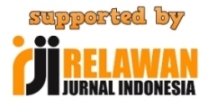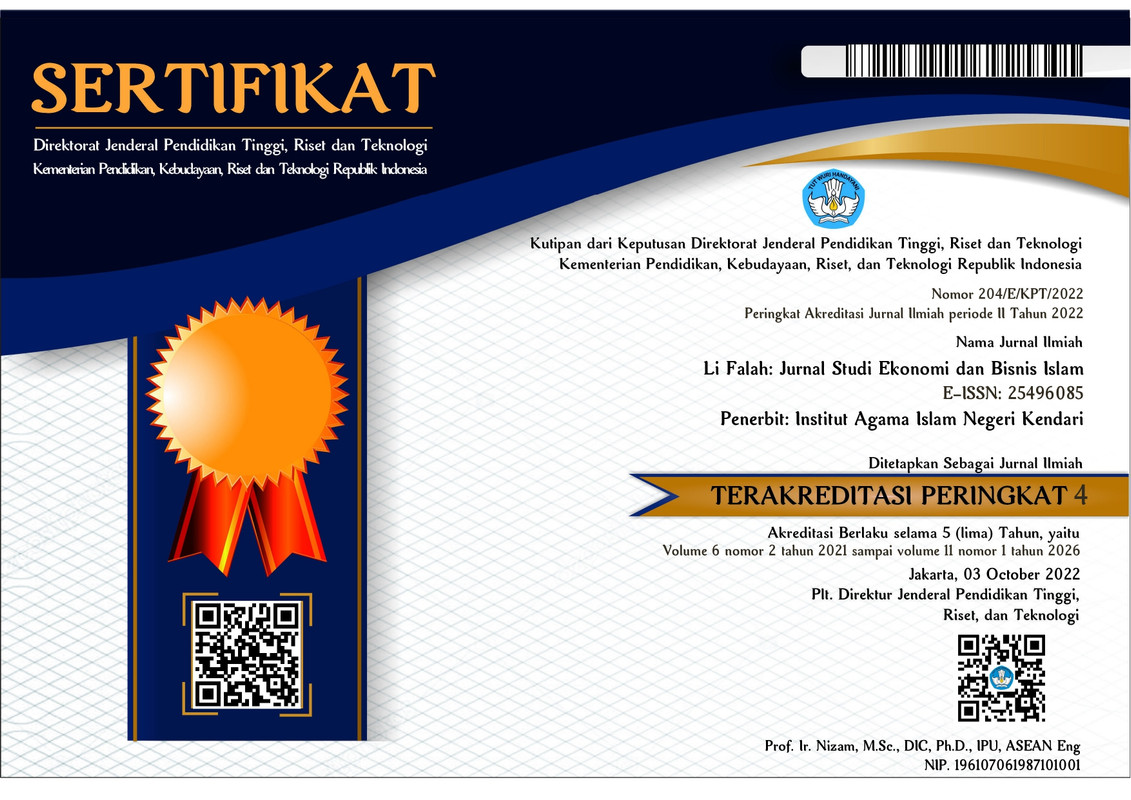Public Interest in Islamic Equity Crowdfunding
Abstract
Equity Crowdfunding is an alternative investment instrument. Indonesia, with the largest Muslim population, is a potential market for Islamic Equity Crowdfunding. The purpose of this study is to identify the motivation of investors to invest in this instrument. There are three subject sizes, namely, related to project funding (network externality and perceived informativeness), related to a platform (perceived accreditation, structural assurance, and third-party seal) related to fundraising (Islamic value congruence, social interaction ties). Belief perspective is divided into cognitive and affective. The sample used is 101 investors spread across Indonesia in a national equity crowdfunding company with Islamic-based management. The data was processed using the structural equation modeling technique using the WarpPLS 7.0 tool. The results of this study prove that cognitive and affective beliefs and network externalities directly influence investor interest. Trust is proven to be able to mediate perceived informativeness on interest. The form of investor cognitive trust is perceived accreditation and third-party seal. The shapers of an investor's affective trust are perceived informativeness, structural assurance, and Islamic value congruence. This finding can be used as the basis for how startup companies in Sharia-based equity crowdfunding instruments build trust and interest.
Keywords
Full Text:
PDFReferences
Arno, A. K., & Assad, A. Z. (2017). Peran Otoritas Jasa Keuangan Dalam Mengawasi Resiko Pembiayaan Dalam Investasi “Bodong.” In Al-Amwal : Journal of Islamic Economic Law (Vol. 2, Issue 1). https://doi.org/10.24256/alw.v2i1.602
Belleflamme, P., Lambert, T., & Schwienbacher, A. (2013). " Crowdfunding : Tapping the right crowd " Référence bibliographique Journal of Business Venturing Crowdfunding : Tapping the right crowd ☆. Crowdfunding: Tapping the Right Crowd, 29(5), 585–609.
Bock, G. W., Lee, J., Kuan, H. H., & Kim, J. H. (2012). The progression of online trust in the multi-channel retailer context and the role of product uncertainty. Decision Support Systems, 53(1), 97–107. https://doi.org/10.1016/j.dss.2011.12.007
Burke, C. S., Sims, D. E., Lazzara, E. H., & Salas, E. (2007). Trust in leadership: A multi-level review and integration. The Leadership Quarterly, 18(6), 606–632.
Chang, S. E., Liu, A. Y., & Lin, S. (2015). Exploring privacy and trust for employee monitoring. Industrial Management & Data Systems.
Cumming, D., Meoli, M., & Vismara, S. (2019). Investors’ choices between cash and voting rights: Evidence from dual-class equity crowdfunding. Research Policy, 48(8), 1–19. https://doi.org/10.1016/j.respol.2019.01.014
Hsiao, C.-C., & Chiou, J.-S. (2012). The effect of social capital on community loyalty in a virtual community: Test of a tripartite-process model. Decision Support Systems, 54(1), 750–757.
Ismal, R. (2013). Islamic Banking in Indonesia. John Wiley & Sons Inc.
Johnson, D., & Grayson, K. (2005). Cognitive and affective trust in service relationships. Journal of Business Research, 58(4), 500–507. https://doi.org/10.1016/S0148-2963(03)00140-1
Kadefors, A. (2004). Trust in project relationships-inside the black box. International Journal of Project Management, 22(3), 175–182. https://doi.org/10.1016/S0263-7863(03)00031-0
Kang, M., Gao, Y., Wang, T., & Zheng, H. (2016). Understanding the determinants of funders’ investment intentions on crowdfunding platforms: A trust-based perspective. Industrial Management & Data Systems.
Kim, D. J., Ferrin, D. L., & Rao, H. R. (2008). A trust-based consumer decision-making model in electronic commerce: The role of trust, perceived risk, and their antecedents. Decision Support Systems, 44(2), 544–564.
Kim, J. U., Kim, W. J., & Park, S. C. (2010). Consumer perceptions on web advertisements and motivation factors to purchase in the online shopping. Computers in Human Behavior, 26(5), 1208–1222.
Kleemann, F., Voß, G. G., & Rieder, K. (2008). Un(der)paid Innovators: The Commercial Utiliza-tion of Consumer Work through Crowdsourcing. Science, Technology & Innovation Studies, 4(1), PP. 5-26.
Latan H, G. I. (2012). Partial least squares: Concept and application path modeling using program XLSTAT-PLS for empirical research. BP UNDIPS.
Liebowitz, S. J., & Margolis, S. E. (1994). Network Externality: An Uncommon Tragedy. Journal of Economic Perspectives, 8(2), 133–150. https://doi.org/10.1257/jep.8.2.133
Littlewood, B., Neil, M., & Ostrolenk, G. (1995). The role of models in managing the uncertainty of software-intensive systems. Reliability Engineering & System Safety, 50(1), 87–95.
Pae, J. H., & Hyun, J. S. (2002). The impact of technology advancement strategies on consumers’ patronage decisions. Journal of Product Innovation Management: An International Publication of the Product Development & Management Association, 19(5), 375–383.
Pavlou, P. A. (2002). Institution-based trust in interorganizational exchange relationships: the role of online B2B marketplaces on trust formation. The Journal of Strategic Information Systems, 11(3–4), 215–243.
Preacher, K. J., & Hayes, A. F. (2008). Assessing mediation in communication research. The Sage sourcebook of advanced data analysis methods for communication ….
Saeedi, M. R. (2014). Fostering Dynamic Capabilities of SMEs. The Impact of Inward International Licensing on Absorptive Capacity and Networking Capability: A Multiple Case Study in Pharmaceutical Industry. Linköping University Electronic Press.
Sahroni. (2018). Fikih Zakat Kontemporer. PT. Rajagrafindo Persada.
Saiti, B., Musito, M. H., & Yucel, E. (2018). Islamic Crowdfunding: Fundamentals, Developments and Challenges. Islamic Quarterly, 62(3), 469–485.
Salman, A., & Nawaz, H. (2018). Islamic financial system and conventional banking: A comparison. Arab Economic and Business Journal, 13(2), 155–167. https://doi.org/10.1016/j.aebj.2018.09.003
Saparito, P., & SAPIENZA, H. J. (2002). THE CENTRAL ROLE OF CALCULUS-BASED TRUST AND RELATIONAL TRUST IN BANK-SMALL FIRM RELATIONSHIPS. Academy of Management Proceedings, 2002(1), K1–K6.
Sari, M., & Nugraha, N. (2019). The Implementation of Role-Playing in Understanding Ponzi Scheme Investment. 65(Icebef 2018), 103–105. https://doi.org/10.2991/icebef-18.2019.25
Wahyuni, R. A. E., & Turisno, B. E. (2019). Praktik Finansial Teknologi Ilegal Dalam Bentuk Pinjaman Online Ditinjau Dari Etika Bisnis. Jurnal Pembangunan Hukum Indonesia, 1(3), 379–391. https://doi.org/10.14710/jphi.v1i3.379-391
DOI: http://dx.doi.org/10.31332/lifalah.v8i1.4544
Copyright (c) 2023 Kabul Trifiyanto

This work is licensed under a Creative Commons Attribution-ShareAlike 4.0 International License.
Li Falah : Jurnal Studi Ekonomi dan Bisnis Islam, Indexed In
Accredited By
View My Stats
Organized by : Fakultas Ekonomi dan Bisnis Islam
Published by : Institut Agama Islam Negeri Kendari
Jl. Sultan Qaimuddin No. 17 Baruga Kota Kendari Provinsi Sulawesi Tenggara
phone. +62401-3193710
Fax. +62401-3193710
Email: [email protected]



















